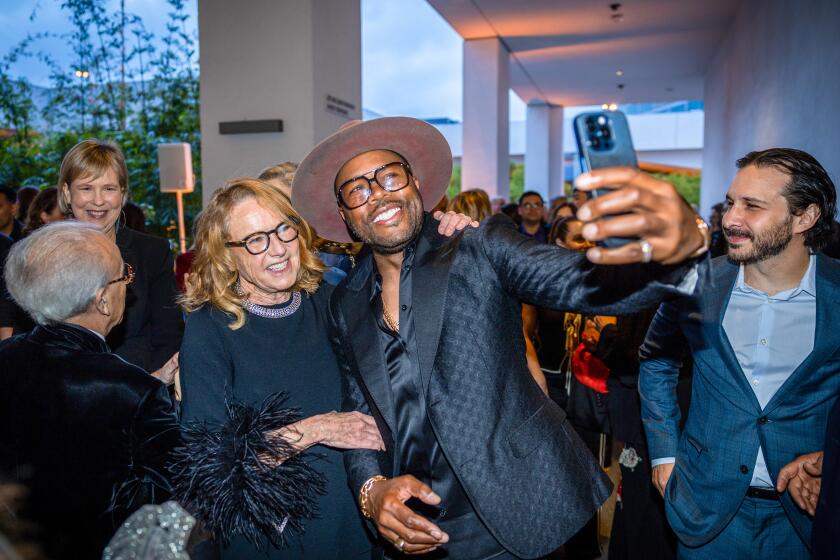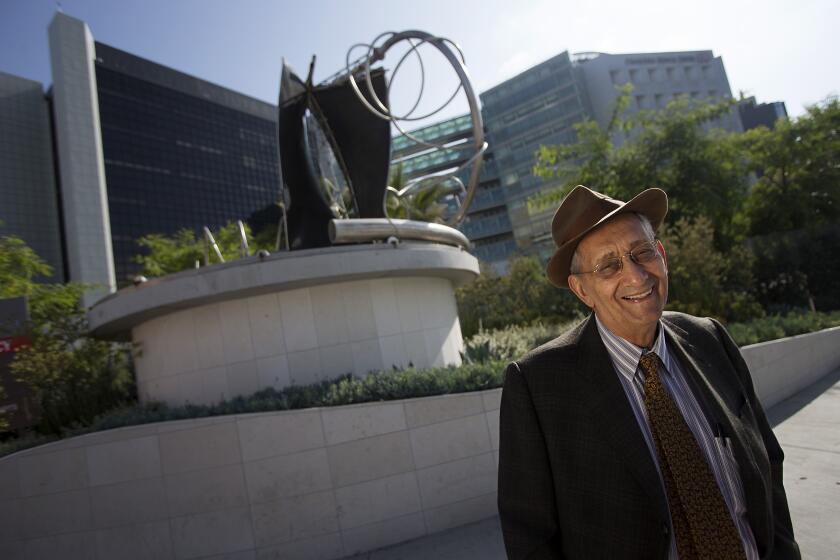Teen Troupe’s Mission Gets Accomplished : Stage: Thanks to volunteers and donations, Theater Quest--founded to use theater as a way to replace gangs in the lives of L.A.-area teens--is performing at the Kennedy Center.
For 400 years, audiences have been moved by William Shakespeare’s “Romeo and Juliet,” a tale of star-crossed love between two teen-agers whose families are bitter enemies. The latest attempt to relate the tragedy of the Veronese Capulets and Montagues to the modern problems of urban teens is a joint venture between Theater Quest, a Pasadena-based theater group for teen-agers, and the John F. Kennedy Center for the Performing Arts.
This production, faithful to the period and to Shakespeare’s words, intends to bridge the gap between different cultures and communities by casting teen-agers, many with little acting experience, in principal roles alongside seasoned adult theater veterans, all of whom have volunteered most of their summer to the effort.
Theater Quest’s “Romeo and Juliet,” which opened Tuesday and runs through Saturday at the Kennedy Center, features a cast and crew of more than 100--about half from the Los Angeles area and half from Washington.
Theatergoers will be unaware of the hurdles that had to be overcome to get this unusual collaboration mounted and the hundreds of volunteers who made it possible.
Theater Quest was launched more than four years ago when Eric Waterhouse, a Los Angeles actor and director, remembering his own troubled teen-age years, decided he wanted to use theater as a way to replace gangs in the lives of L.A.-area teens.
Waterhouse, 40, decided to target young people between 13 and 20 who were “at risk.” He spent more than a year trying to get funding for his idea. When the L.A. riots erupted in the spring of 1992, he decided to move forward, funding or no funding, working with partner Lauralee Mannes, 38, a free-lance writer who signed on to co-produce the first production of “Romeo and Juliet,” staged in 1992 at Pasadena High School.
Three more productions followed--”Equus” in the spring of 1993, “Cyrano de Bergerac” that summer and Shakespeare’s “Pericles” in the summer of 1994.
The group has always relied on donations for support, but while it’s one thing to put on a performance in a high school auditorium, it’s quite another to stage a full-scale production in the nation’s premier performing arts center. The list of those who made that possible, starting with the Kennedy Center and its staff, is long indeed. Food, transportation and housing all had to be arranged and no one involved with this production is being paid.
Were this show being professionally mounted on the Kennedy Center Opera House’s stage, it’s estimated the price tag would come in around $500,000. One of the most significant contributions and one that gives this production an especially polished appearance, are the sets and costumes provided by the Washington Opera company from a previous performance of “Rigoletto.”
Kennedy Center master carpenter Mickey Berra’s early involvement was instrumental in making Theater Quest’s dream to perform at the Kennedy Center a reality. Berra, 50, is a gregarious, bighearted man who has worked at the Kennedy Center almost consistently since its opening 25 years ago and who is now manager of the Opera House’s backstage operations.
Berra, who quit school in the fifth grade and worked in a traveling carnival, identified with the young people, and helped sell the other members of the Kennedy Center’s stagehands union on volunteering their services. He also was instrumental in getting the sets, costumes and lighting for the production.
Darrell Aranda, 17, who just graduated from John Muir High School in Pasadena, has been working closely with Berra since the group arrived in Washington. Aranda says his involvement with Theater Quest has helped him focus and stay out of trouble; in September, he plans to attend Los Angeles City College’s theater academy and says he hopes to make a career doing technical work in theater and movies.
Angell Estrada, 19, who plays Juliet, says Theater Quest has provided her with affection and warmth. “I was so welcomed into the group right away. I loved going to rehearsals, I loved getting hugs,” she says.
The product of a teen-age pregnancy, she was shuffled between her father and mother, who did not live together; then she dropped out of high school and moved out on her own when she was 17. She has worked at a methadone clinic doing testing for HIV and performed with an AIDS education outreach group and at Renaissance fairs in California. She had a small role in Theater Quest’s production of “Pericles” last year.
She admits to being overwhelmed and scared at the prospect of walking out on the Opera House stage to a house that seats 2,000.
Romeo, played by Ramon de Ocampo, by contrast, is probably the closest thing to a theater professional among the teen-age cast members. He was born in the Philippines, but currently lives in a Virginia suburb of Washington; his father, Roberto de Ocampo, is the Philippine minister of finance. De Ocampo, 19, is about to begin his second year as a theater major at Carnegie Mellon University in Pittsburgh, and learned about this production through an ad in the Washington Post.
In addition to taking out ads, Theater Quest recruited the D.C. cast through social workers, federal housing projects and schools, including the Duke Ellington High School for the Performing Arts, in much the same way they got the word out in California.
Many in the D.C. cast, like Theater Quest’s early L.A. actors, had never been onstage before. Waterhouse says as long as the teen-agers are willing to take the project seriously and follow the rules, such as showing up for rehearsals, he never turns anyone away who wants to be involved.
More to Read
The biggest entertainment stories
Get our big stories about Hollywood, film, television, music, arts, culture and more right in your inbox as soon as they publish.
You may occasionally receive promotional content from the Los Angeles Times.






